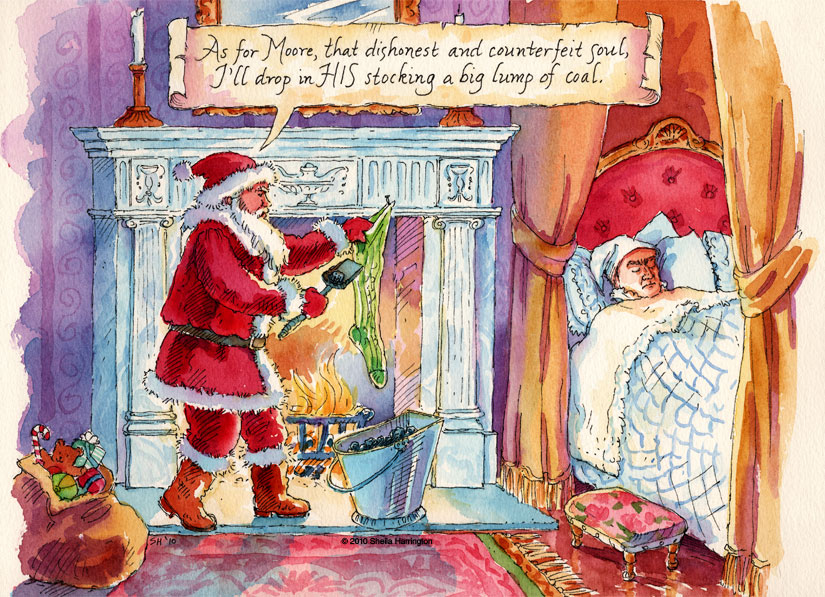(continued from December 6th)
However, after Livingston’s death in 1829, Moore quietly wrote to the newspaper asking if they knew the author of the popular verse, “The Night Before Christmas.” When the editors replied that they did not, as it had been published anonymously, Moore claimed authorship, saying that he had been “too embarrassed” to claim it previously. His surprised and delighted family, and many others, came to believe him.
When Moore later included it in a book of “his” poetry (which actually included several other poems later revealed not to be Moore’s own—tsk, tsk), the astonished Livingston children protested. But would a rich and respected theologian actually LIE about his work? Not to be believed. So nobody did. Livingston’s papers, including his handwritten copy of the poem with its changes and crossed-out passages, had perished in a fire, and the children had no evidence beyond their personal knowledge. Moore later churned out several handwritten copies of his own (not exactly matching Livingston’s original, but what the heck) which eventually sold to collectors for big bucks.
End of story… until the arrival on the scene of Donald Foster, an English professor at Vassar and a well-known textual scholar, who included in his 2000 book Author Unknown a fascinating analysis of the use of language in the work of Moore and of Livingston. His conclusion, built step by step on literary evidence, is that Livingston, and not Moore, authored the poem in question.
But even we lay people, dear reader, can probably deduce this for ourselves by reading further examples of poetry.
For example, contrast with Moore’s grim and foreboding efforts the poem Livingston wrote for his own daughter’s marriage:
‘Twas summer when softly the breezes were blowing And Hudson majestic so sweetly was flowing The groves rang with music & accents of pleasure And nature in rapture beat time to the measure When Helen and Jonas so true and so loving Along the green lawn were seen arm in arm moving Sweet daffodils, violets and roses spontaneous Wherever they wandered sprang up instantaneous.And another, in a letter to his brother, praising the sewing of a cousin:
To my dear brother Beekman I sit down to write Ten minutes past eight & a very cold night. Not far from me sits with a baullancy cap on Our very good couzin, Elizabeth Tappen, A tighter young seamstress you’d ne’er wish to see And she (blessings on her) is sewing for me. New shirts & new cravats this morning cut out Are tumbled in heaps and lye huddled about. My wardrobe (a wonder) will soon be enriched With ruffles new hemmed & wristbands new stitched.The only real benefit from Moore’s perpetrated fraud is that Livingston’s poem has survived for generations to enjoy it. Perhaps now, thanks to Donald Foster, its true author will be recognized.

